Results
-
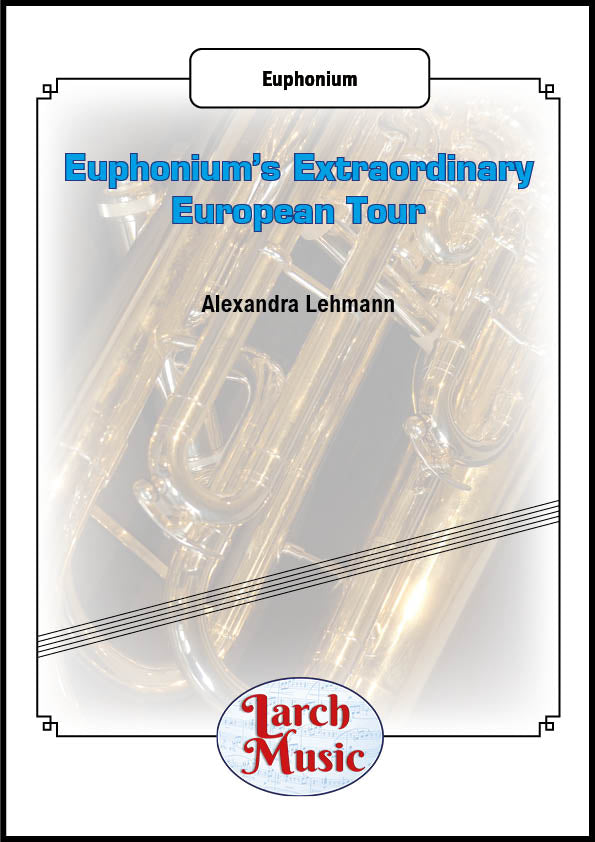 £9.95
£9.95Euphonium's Extraordinary European Tour - Solo Euphonium (Treble Clef) - LM168
COMPOSER: Alexandra LehmannEuphonium's Extraordinary European TourThe year 2020 will be infamously recorded as a time when musicians had to lead a solitary life, which is incompatible with musical activity.Furthermore, I wanted to offer an experience of travelling in Europe through music.There is a wealth of historical, and traditional European monophonic music.Hence, the Tour is based around the 14th-15th centuries whenEuphoniumencounters different musical cultures.The Tour is dedicated to my father, mother, brother, and sister;Jean-Pierre, Francoise, Fabrice, and Mahaut Lehmann;with whom I was fortunate to travel in my youth.CONTENTS1. Ostentatious OvertureEuphoniumis at the French palace of Versailles with all itspomp, splendour, and magnificence.2. Mystical MinnesangerEuphoniumhas travelled to the Holy Roman Empire, where he isperforming an ode to a Germanic Knight.3. Andalusian NightsThe Caliphate of Cordoba was a mixing-pot of Islamicand Judaic music. What is fascinating is that many of the ideas aroundperformance; modes at certain times of the day, improvisation into metred,faster sections; go back to the Indian subcontinent and even furtherback into Ancient Greece.Euphonium is chanting for theCaliphate on a warm summer's evening.4. Tarantella of the TagliatelleI don't know if the Medici family ate tagliatelle,but if they did, this joyful and lively tarantella is whatEuphonium would have played.5. Terrifying TropakA complete change of mood.Euphonium is playing for a swashbucklingperformance of Ukrainian Cossacks, with leaps, stamps, and twirls.6. Sami Herding SongIn the Arctic Norwegian north,Euphonium is with the Sami calling theirherd of reindeers with vocalisations that echo in the icy distance.7. Highland FlingEuphoniumis in Scotland taking part in the Highland Games.Female dancers perform athletic jumps.8. Royal Festive FanfareEuphoniumfinishes his European Tour at Windsor Castle, England.Like the natural trumpet (played at the time), the lower range is based on the first notes of the harmonic scale and announce the entry of the royal family.
In Stock: Estimated dispatch 3-5 working days
-
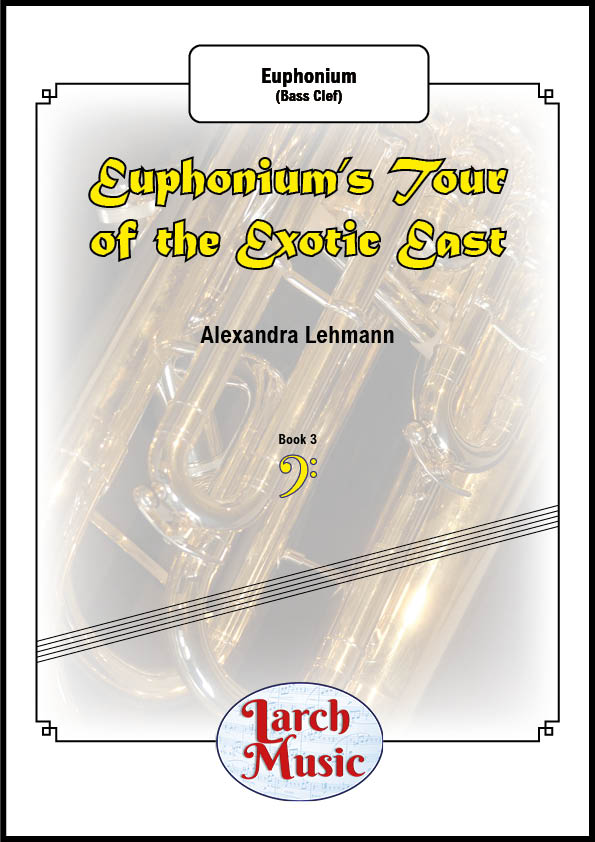 £9.95
£9.95Euphonium's Tour of The Exotic East - Solo Euphonium (Bass Clef) - LM173
COMPOSER: Alexandra LehmannEuphonium's Tour of The Exotic EastThe year 2020 will be infamously recorded as a time when musicians had to lead a solitary life, which is incompatible with musical activity.1. Dynamic Dabkeh DanceEuphoniumplays for a 'Dynamic Dabkeh Dance' in the Levant,where dancers dance energetically in a circle to celebrate a wedding.2. Slithering Snake Charmer's Sinuous ChantEuphoniumplays a 'Sinuous chant for a Slithering Snake' as asnake-charmer in the Indian subcontinent.The slithering snake undulates in response to the raga-infused melody.3. Merry MadagascarEuphoniumtravels south-east to the island of Madagascarwhere here is a village harvest Carnival,with much merriment and communal music.4. Lively and Luxurious Lion DanceFurther north,Euphonium participates in the Far Easternlively and luxurious Lion Dance to bring good luck and fortune.5. Indonesian GamelanEuphoniummust hurry to Indonesia where there is anIndonesian Gamelan puppet whole-tone scale musical performance,with chiming large gongs, and fast clattering metallophones.6. Polynesian PartyEuphoniumtakes the boat to the Polynesian Islandsto play at a Party celebrating the sea.7. Anthem to the ChrysanthemumFinally,Euphonium goes up north again and plays homagewith an Anthem to the mystical Chrysanthemum with a pentatonic melody representing happiness, love, longevity, nobility, and joy.
In Stock: Estimated dispatch 3-5 working days
-
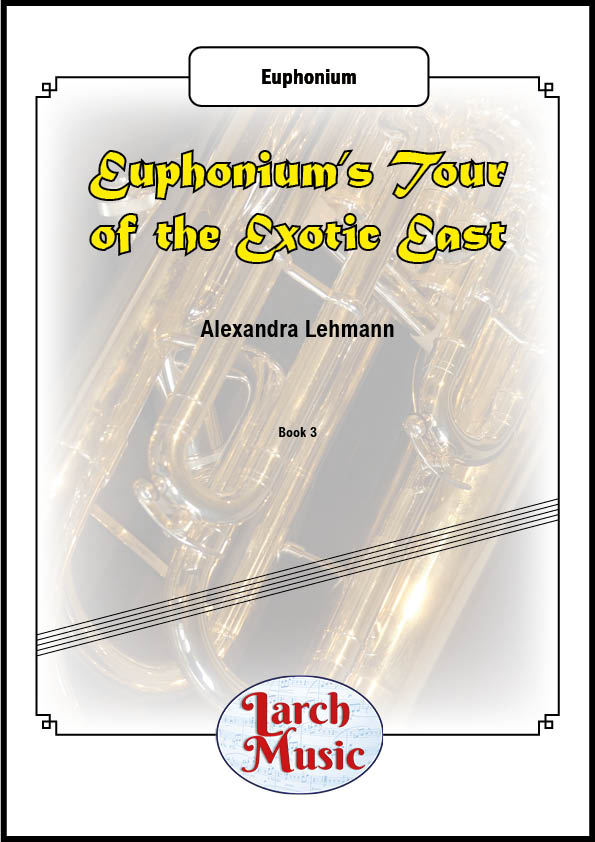 £9.95
£9.95Euphonium's Tour of The Exotic East - Solo Euphonium (Treble Clef) - LM170
COMPOSER: Alexandra LehmannEuphonium's Tour of The Exotic EastThe year 2020 will be infamously recorded as a time when musicians had to lead a solitary life, which is incompatible with musical activity.1. Dynamic Dabkeh DanceEuphoniumplays for a 'Dynamic Dabkeh Dance' in the Levant,where dancers dance energetically in a circle to celebrate a wedding.2. Slithering Snake Charmer's Sinuous ChantEuphoniumplays a 'Sinuous chant for a Slithering Snake' as asnake-charmer in the Indian subcontinent.The slithering snake undulates in response to the raga-infused melody.3. Merry MadagascarEuphoniumtravels south-east to the island of Madagascarwhere here is a village harvest Carnival,with much merriment and communal music.4. Lively and Luxurious Lion DanceFurther north,Euphonium participates in the Far Easternlively and luxurious Lion Dance to bring good luck and fortune.5. Indonesian GamelanEuphoniummust hurry to Indonesia where there is anIndonesian Gamelan puppet whole-tone scale musical performance,with chiming large gongs, and fast clattering metallophones.6. Polynesian PartyEuphoniumtakes the boat to the Polynesian Islandsto play at a Party celebrating the sea.7. Anthem to the ChrysanthemumFinally,Euphonium goes up north again and plays homagewith an Anthem to the mystical Chrysanthemum with a pentatonic melody representing happiness, love, longevity, nobility, and joy.
In Stock: Estimated dispatch 3-5 working days
-
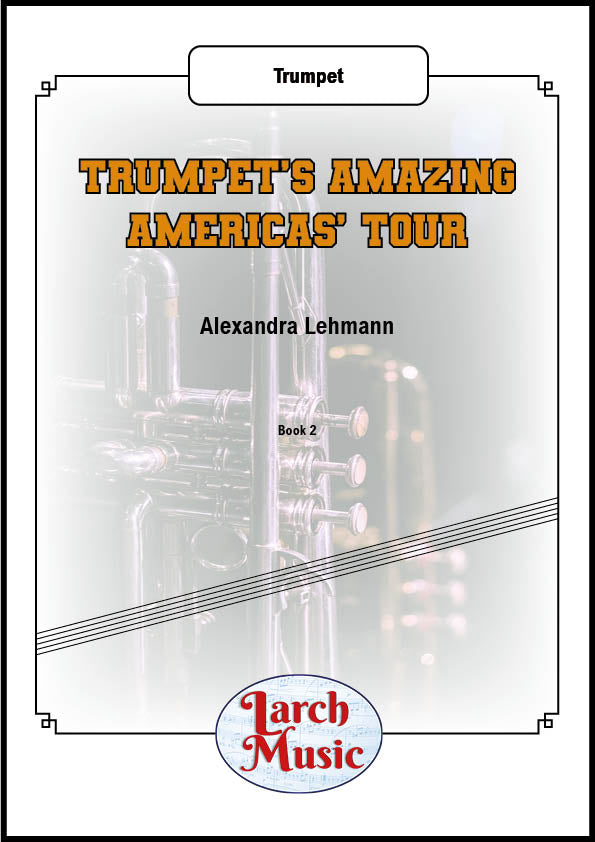 £9.95
£9.95Trumpet's Amazing Americas Tour - Solo Trumpet - LM187
COMPOSER: Alexandra LehmannTrumpet's Amazing Americas TourThe year 2020 will be infamously recorded as a time when musicians had to lead a solitary life, which is incompatible with musical activity.1. Hearty HoedownTrumpetplays at a lively, social, rural gathering;a 'hoedown'; for cowboys and girls. Yeeha!2. Barcarolle BluesOn the 18th of December 1865, the 13th Amendment(abolishing slavery in USA) was officially adopted into the Constitution.Trumpetis on a boat sailing the Mississippi with former slavestravelling further north in hope of a better life.As the river gently sways the traumatised passengers,they find solace in music-making.3. Kindred KlezmerTrumpetis playing for Ashkenazi (West and East European)Jews dancing fervently and with joy as a community.4. Carnival CalypsoFurther south, in 1834,Trumpet is playing at a carnivalcompetition in Trinidad, celebrating the abolition of slavery.It is in call (the lead singer)-and-response (the rest of the group) form.The chariot passes through cheering crowds,and trundles merrily into the distance.5. Tantalising TangoTrumpetis at a dance theatre in downtown Buenos Aires,playing an intense, and moody tango.Couples dance in a passionate and powerful embrace.6. Hallowed Harawi of the IncasThe Incas are no more, like so many indigenouspeoples of the Americas.Trumpet plays an Incan Harawi,a love song, as their spirit still echoes across the valleys,mountains, forests, and rivers that nurtured them in ancient times.
In Stock: Estimated dispatch 3-5 working days
-
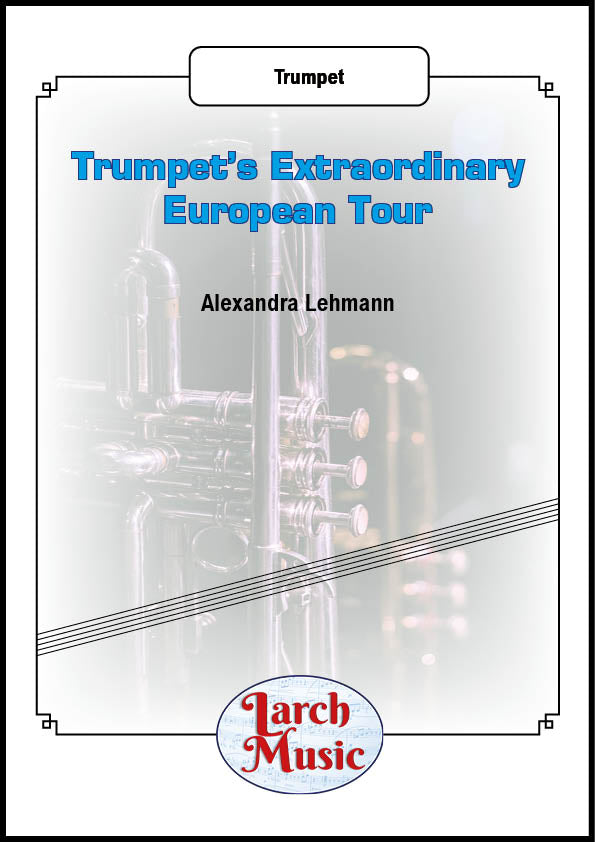 £9.95
£9.95Trumpet's Extraordinary European Tour - Solo Trumpet - LM186
COMPOSER: Alexandra LehmannTrumpet's Extraordinary European TourThe year 2020 will be infamously recorded as a time when musicians had to lead a solitary life, which is incompatible with musical activity.Furthermore, I wanted to offer an experience of travelling in Europe through music.There is a wealth of historical, and traditional European monophonic music.Hence, the Tour is based around the 14th-15th centuries whenEuphoniumencounters different musical cultures.The Tour is dedicated to my father, mother, brother, and sister;Jean-Pierre, Francoise, Fabrice, and Mahaut Lehmann;with whom I was fortunate to travel in my youth.CONTENTS1. Ostentatious OvertureTrumpet is at the French palace of Versailles with all itspomp, splendour, and magnificence.2. Mystical MinnesangerTrumpethas travelled to the Holy Roman Empire, where he isperforming an ode to a Germanic Knight.3. Andalusian NightsThe Caliphate of Cordoba was a mixing-pot of Islamicand Judaic music. What is fascinating is that many of the ideas aroundperformance; modes at certain times of the day, improvisation into metred,faster sections; go back to the Indian subcontinent and even furtherback into Ancient Greece.Trumpetis chanting for theCaliphate on a warm summer's evening.4. Tarantella of the TagliatelleI don't know if the Medici family ate tagliatelle,but if they did, this joyful and lively tarantella is whatTrumpet would have played.5. Terrifying TropakA complete change of mood.Trumpet is playing for a swashbucklingperformance of Ukrainian Cossacks, with leaps, stamps, and twirls.6. Sami Herding SongIn the Arctic Norwegian north,Trumpet is with the Sami calling theirherd of reindeers with vocalisations that echo in the icy distance.7. Highland FlingTrumpetis in Scotland taking part in the Highland Games.Female dancers perform athletic jumps.8. Royal Festive FanfareTrumpetfinishes his European Tour at Windsor Castle, England.Like the natural trumpet (played at the time), the lower range is based on the first notes of the harmonic scale and announce the entry of the royal family.
In Stock: Estimated dispatch 3-5 working days
-
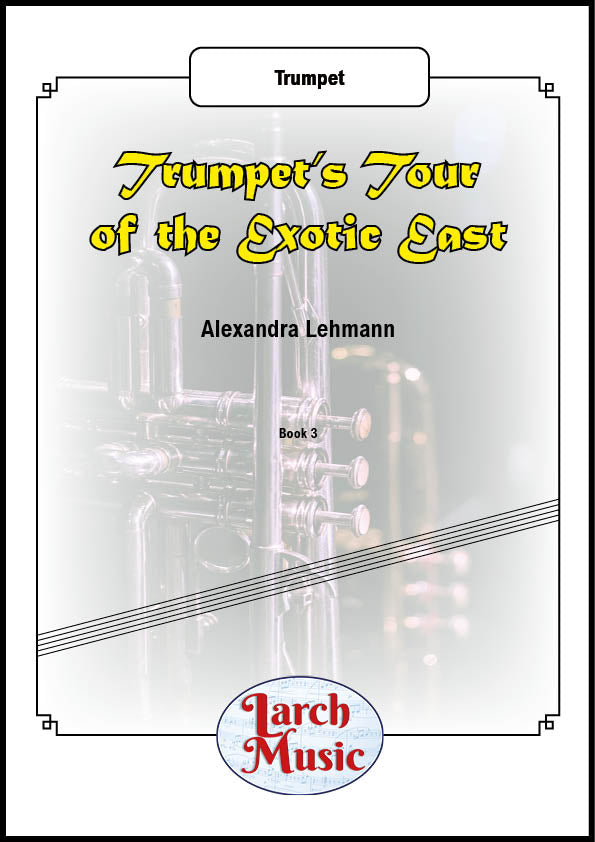 £9.95
£9.95Trumpet's Tour of The Exotic East - Solo Trumpet - LM188
COMPOSER: Alexandra LehmannTrumpet's Tour of The Exotic EastThe year 2020 will be infamously recorded as a time when musicians had to lead a solitary life, which is incompatible with musical activity.1. Dynamic Dabkeh DanceTrumpetplays for a 'Dynamic Dabkeh Dance' in the Levant,where dancers dance energetically in a circle to celebrate a wedding.2. Slithering Snake Charmer's Sinuous ChantTrumpetplays a 'Sinuous chant for a Slithering Snake' as asnake-charmer in the Indian subcontinent.The slithering snake undulates in response to the raga-infused melody.3. Merry MadagascarTrumpettravels south-east to the island of Madagascarwhere here is a village harvest Carnival,with much merriment and communal music.4. Lively and Luxurious Lion DanceFurther north,Trumpet participates in the Far Easternlively and luxurious Lion Dance to bring good luck and fortune.5. Indonesian GamelanTrumpetmust hurry to Indonesia where there is anIndonesian Gamelan puppet whole-tone scale musical performance,with chiming large gongs, and fast clattering metallophones.6. Polynesian PartyTrumpettakes the boat to the Polynesian Islandsto play at a Party celebrating the sea.7. Anthem to the ChrysanthemumFinally,Trumpet goes up north again and plays homagewith an Anthem to the mystical Chrysanthemum with a pentatonic melody representing happiness, love, longevity, nobility, and joy.
In Stock: Estimated dispatch 3-5 working days






